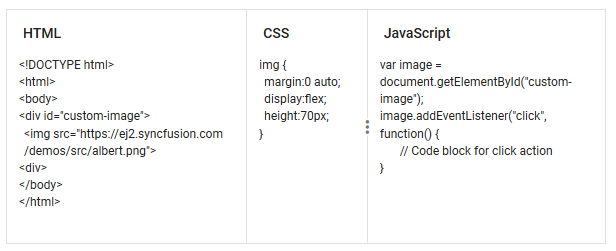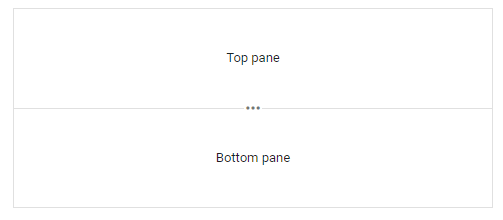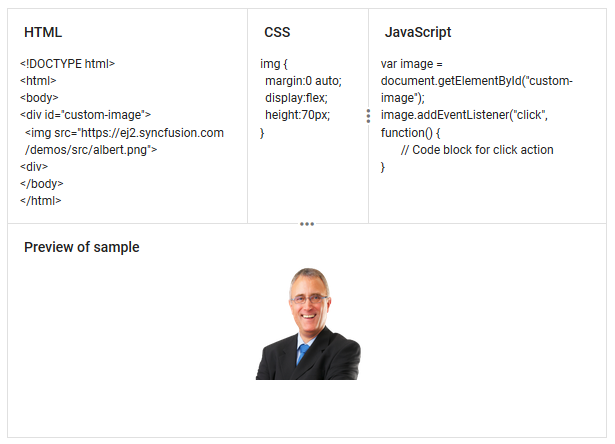How can I help you?
Getting Started with ASP.NET Core Splitter Control
26 Dec 202515 minutes to read
This section briefly explains about how to include ASP.NET Core Splitter control in your ASP.NET Core application using Visual Studio.
Prerequisites
System requirements for ASP.NET Core controls
Create ASP.NET Core web application with Razor pages
Install ASP.NET Core package in the application
To add ASP.NET Core controls in the application, open the NuGet package manager in Visual Studio (Tools → NuGet Package Manager → Manage NuGet Packages for Solution), search for Syncfusion.EJ2.AspNet.Core and then install it. Alternatively, you can utilize the following package manager command to achieve the same.
Install-Package Syncfusion.EJ2.AspNet.Core -Version 32.2.3NOTE
Syncfusion® ASP.NET Core controls are available in nuget.org. Refer to NuGet packages topic to learn more about installing NuGet packages in various OS environments. The Syncfusion.EJ2.AspNet.Core NuGet package has dependencies, Newtonsoft.Json for JSON serialization and Syncfusion.Licensing for validating Syncfusion® license key.
Add Syncfusion® ASP.NET Core Tag Helper
Open ~/Pages/_ViewImports.cshtml file and import the Syncfusion.EJ2 TagHelper.
@addTagHelper *, Syncfusion.EJ2Add stylesheet and script resources
Here, the theme and script is referred using CDN inside the <head> of ~/Pages/Shared/_Layout.cshtml file as follows,
<head>
...
<!-- Syncfusion ASP.NET Core controls styles -->
<link rel="stylesheet" href="https://cdn.syncfusion.com/ej2/32.2.3/fluent.css" />
<!-- Syncfusion ASP.NET Core controls scripts -->
<script src="https://cdn.syncfusion.com/ej2/32.2.3/dist/ej2.min.js"></script>
</head>NOTE
Checkout the Themes topic to learn different ways (CDN, NPM package, and CRG) to refer styles in ASP.NET Core application, and to have the expected appearance for Syncfusion® ASP.NET Core controls.
NOTE
Checkout the Adding Script Reference topic to learn different approaches for adding script references in your ASP.NET Core application.
Register Syncfusion® Script Manager
Also, register the script manager <ejs-script> at the end of <body> in the ASP.NET Core application as follows.
<body>
...
<!-- Syncfusion ASP.NET Core Script Manager -->
<ejs-scripts></ejs-scripts>
</body>Add ASP.NET Core Splitter control
Now, add the Syncfusion® ASP.NET Core Splitter tag helper in ~/Pages/Index.cshtml page.
<ejs-splitter id="splitter" height="250px" width="600px">
<e-splitter-panes>
<e-splitter-pane content="<div></div>"></e-splitter-pane>
<e-splitter-pane content="<div></div>"></e-splitter-pane>
<e-splitter-pane content="<div></div>"></e-splitter-pane>
</e-splitter-panes>
</ejs-splitter>Press Ctrl+F5 (Windows) or ⌘+F5 (macOS) to run the app. Then, the Syncfusion® ASP.NET Core Splitter control will be rendered in the default web browser.

Load content to the pane
You can load the pane contents in either HTML element or string types using content property.
For detailed information, refer to the Pane Content section.
<ejs-splitter id="splitter" height="250px" width="550px">
<e-splitter-panes>
<e-splitter-pane content="<div class='content'><h3 class='h3'>HTML</h3><div class='code-preview'><<span>!DOCTYPE html></span><div><<span>html></span></div><div><<span>body></span></div><<span>div</span> id='custom-image'><div style='margin-left: 5px'><<span>img</span> src='src/albert.png'></div><div><<span>div</span>></div><div><<span>/body></span></div><div><<span>/html></span></div></div></div>"></e-splitter-pane>
<e-splitter-pane content="<div class='content'><h3 class='h3'>CSS</h3><div class='code-preview'><span>img {</span><div id='code-text'>margin:<span>0 auto;</span></div><div id='code-text'>display:<span>flex;</span></div><div id='code-text'>height:<span>70px;</span></div><span> }</span></div></div>"></e-splitter-pane>
<e-splitter-pane content="<div class='content'><h3 class='h3'>JavaScript</h3><div class='code-preview'><span>var</span> image = document.getElementById('custom-image');<div>image.addEventListener('click', function() {</div><div style='padding-left: 20px;'>// Code block for click action</div><span> }</span></div></div>"></e-splitter-pane>
</e-splitter-panes>
</ejs-splitter>
<style>
#code-text {
margin-left: 5px;
}
.code-preview {
margin-top: 15px;
font-size: 12px;
}
.h3 {
font-size: 14px;
margin: 4px;
}
.content {
padding: 12px;
}
.splitter-image {
margin: 0 auto;
display: flex;
height: 115px;
margin-top: 10px;
}
</style>
Configure pane size
You can specify the size to each pane using size property. It accepts pane values in percentage and pixel types.
In case of pane size is not declared, panes will equally share the sizes automatically.
NOTE
For Horizontal orientation, panes will share the total width.
For Vertical orientation, panes will share the total height.
<ejs-splitter id="splitter" height="250px" width="550px">
<e-splitter-panes>
<e-splitter-pane size="40%" content="<div class='content'><h3 class='h3'>HTML</h3><div class='code-preview'><<span>!DOCTYPE html></span><div><<span>html></span></div><div><<span>body></span></div><<span>div</span> id='custom-image'><div style='margin-left: 5px'><<span>img</span> src='src/albert.png'></div><div><<span>div</span>></div><div><<span>/body></span></div><div><<span>/html></span></div></div></div>"></e-splitter-pane>
<e-splitter-pane size="20%" content="<div class='content'><h3 class='h3'>CSS</h3><div class='code-preview'><span>img {</span><div id='code-text'>margin:<span>0 auto;</span></div><div id='code-text'>display:<span>flex;</span></div><div id='code-text'>height:<span>70px;</span></div><span> }</span></div></div>"></e-splitter-pane>
<e-splitter-pane size="40%" content="<div class='content'><h3 class='h3'>JavaScript</h3><div class='code-preview'><span>var</span> image = document.getElementById('custom-image');<div>image.addEventListener('click', function() {</div><div style='padding-left: 20px;'>// Code block for click action</div><span> }</span></div></div>"></e-splitter-pane>
</e-splitter-panes>
</ejs-splitter>
<style>
#code-text {
margin-left: 5px;
}
.code-preview {
margin-top: 15px;
font-size: 12px;
}
.h3 {
font-size: 14px;
margin: 4px;
}
.content {
padding: 12px;
}
.splitter-image {
margin: 0 auto;
display: flex;
height: 115px;
margin-top: 10px;
}
</style>Resizable panes
Splitter allows you to change the pane dimensions by resizing the panes. By default, all the panes are resizable. You can disable the resize by using resizable property in each pane settings.
<ejs-splitter id="splitter" height="250px" width="550px">
<e-splitter-panes>
<e-splitter-pane size="40%" min="30px" resizable="false" content="<div class='content'><h3 class='h3'>HTML</h3><div class='code-preview'><<span>!DOCTYPE html></span><div><<span>html></span></div><div><<span>body></span></div><<span>div</span> id='custom-image'><div style='margin-left: 5px'><<span>img</span> src='src/albert.png'></div><div><<span>div</span>></div><div><<span>/body></span></div><div><<span>/html></span></div></div></div>"></e-splitter-pane>
<e-splitter-pane size="20%" min="15%" content="<div class='content'><h3 class='h3'>CSS</h3><div class='code-preview'><span>img {</span><div id='code-text'>margin:<span>0 auto;</span></div><div id='code-text'>display:<span>flex;</span></div><div id='code-text'>height:<span>70px;</span></div><span> }</span></div></div>"></e-splitter-pane>
<e-splitter-pane size="40%" content="<div class='content'><h3 class='h3'>JavaScript</h3><div class='code-preview'><span>var</span> image = document.getElementById('custom-image');<div>image.addEventListener('click', function() {</div><div style='padding-left: 20px;'>// Code block for click action</div><span> }</span></div></div>"></e-splitter-pane>
</e-splitter-panes>
</ejs-splitter>
Set minimum and maximum pane sizes
Splitter allows you to set the minimum and maximum sizes for each pane. Resize will happens up to the minimum and maximum values only. It will accepts the size in both percentage and pixel formats.
<ejs-splitter id="splitter" height="250px" width="550px">
<e-splitter-panes>
<e-splitter-pane size="40%" min="30px" max="60%" resizable="false" content="<div class='content'><h3 class='h3'>HTML</h3><div class='code-preview'><<span>!DOCTYPE html></span><div><<span>html></span></div><div><<span>body></span></div><<span>div</span> id='custom-image'><div style='margin-left: 5px'><<span>img</span> src='src/albert.png'></div><div><<span>div</span>></div><div><<span>/body></span></div><div><<span>/html></span></div></div></div>"></e-splitter-pane>
<e-splitter-pane size="20%" min="15%" max="40%" content="<div class='content'><h3 class='h3'>CSS</h3><div class='code-preview'><span>img {</span><div id='code-text'>margin:<span>0 auto;</span></div><div id='code-text'>display:<span>flex;</span></div><div id='code-text'>height:<span>70px;</span></div><span> }</span></div></div>"></e-splitter-pane>
<e-splitter-pane size="40%" content="<div class='content'><h3 class='h3'>JavaScript</h3><div class='code-preview'><span>var</span> image = document.getElementById('custom-image');<div>image.addEventListener('click', function() {</div><div style='padding-left: 20px;'>// Code block for click action</div><span> }</span></div></div>"></e-splitter-pane>
</e-splitter-panes>
</ejs-splitter>Orientation
Splitter supports both Horizontal and Vertical orientation for the panes. By default, it will be rendered in Horizontal orientation. You can change it by using orientation property.
<ejs-splitter id="splitter" height="200px" width="550px" orientation="Vertical">
<e-splitter-panes>
<e-splitter-pane size="50%" min="30%" content="<div class='content'> Top pane</div>"></e-splitter-pane>
<e-splitter-pane size="50%" min="30%" content="<div class='content'> Bottom pane</div>"></e-splitter-pane>
</e-splitter-panes>
</ejs-splitter>
<style>
.content {
justify-content: center;
text-align: center;
align-items: center;
height: 100%;
display: flex;
}
</style>
Nested Splitter
Splitter provides support to render the nested pane to achieve the complex layouts. You can render the nested splitter using the <div> element provided for parent splitter.
Also you can render the nested splitter using direct child of the splitter pane. For this, nested splitter should have 100% width and height to match with the parent pane dimensions.
@{
var pane4Content = "<div class='content'><h3 class='h3'>Preview of sample</h3><div class='splitter-image'><img class='img1' src='https://ej2.syncfusion.com/demos/src/listview/images/albert.png' style='width: 20%;margin: 0 auto;'></div></div>";
}
<div class="pane1">
<ejs-splitter id="outerSplitter" height="430px" width="600px" orientation="Vertical" created="onLoad">
<e-splitter-panes>
<e-splitter-pane size="50%" min="30%"></e-splitter-pane>
<e-splitter-pane content=@pane4Content></e-splitter-pane>
</e-splitter-panes>
</ejs-splitter>
</div>
<style>
.h3 {
font-size: 14px;
margin: 4px;
}
.content {
padding: 12px;
}
.splitter-image {
margin: 0 auto;
display: flex;
height: 115px;
margin-top: 10px;
}
#code-text {
margin-left: 5px;
}
.code-preview {
margin-top: 15px;
font-size: 12px;
}
</style>
<script>
var pane1Content = "<div><div class='content'><h3 class='h3'>HTML</h3><div class='code-preview'><<span>!DOCTYPE html></span><div><<span>html></span></div>" +
"<div><<span>body></span></div><<span>div</span> id='custom-image'><div style='margin-left: 5px'><<span>img</span> src='src/albert.png'></div>" +
"<div><<span>div</span>></div><div><<span>/body></span></div><div><<span>/html></span></div></div></div></div>";
var pane2Content = "<div><div class='content'><h3 class='h3'>CSS</h3><div class='code-preview'><span>img {</span><div id='code-text'>margin:<span>0 auto;</span></div>" +
"<div id='code-text'>display:<span>flex;</span></div><div id='code-text'>height:<span>70px;</span></div><span>}</span></div></div></div>";
var pane3Content = "<div><div class='content'><h3 class='h3'>JavaScript</h3><div class='code-preview'><span>var </span>" +
"image = document.getElementById('custom-image');<div>image.addEventListener('click', function() {</div>" +
"<div style='padding-left: 20px;'>// Code block for click action</div><span> }</span></div></div></div>";
function onLoad() {
document.getElementById('outerSplitter').querySelector('.e-pane-vertical').setAttribute('id', 'Innersplitter');
var splitterObj = new ej.layouts.Splitter({
height: '250px',
paneSettings: [
{
size: '40%', min: '30px', resizable: false, content: pane1Content
},
{
size: '20%', min: '15%', content: pane2Content
},
{
size: '40%', content: pane3Content
}
],
width: '100%'
});
splitterObj.appendTo('#Innersplitter');
}
</script>
NOTE